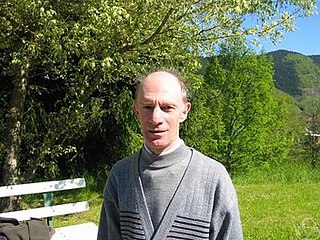This is a list of mathematicians of Jewish-Ukrainian descent.
This is a list of mathematicians of Jewish-Ukrainian descent.

Boris I, venerated as Saint Boris I (Mihail) the Baptizer, was the ruler (knyaz) of the First Bulgarian Empire in 852–889. The historian Steven Runciman called him one of the greatest persons in history. Despite a number of military setbacks, the reign of Boris I was marked with significant events that shaped Bulgarian and European history. With the Christianization of Bulgaria in 864, paganism was abolished. A skillful diplomat, Boris I successfully exploited the conflict between the Patriarchate of Constantinople and the Papacy to secure an autocephalous Bulgarian Church, thus dealing with the nobility's concerns about Byzantine interference in Bulgaria's internal affairs.

Naum (Bulgarian and Macedonian: Свети Наум, Sveti Naum, also known as Naum of Ohrid or Naum of Preslav, was a medieval Bulgarian writer and missionary among the Slavs, considered one of the Seven Apostles of the First Bulgarian Empire. He was among the disciples of Cyril and Methodius and is associated with the creation of the Glagolitic and Cyrillic script. Naum was among the founders of the Pliska Literary School. Afterwards Naum worked at the Ohrid Literary School. He was among the first saints declared by the Bulgarian Orthodox Church after its foundation in the 9th century. The mission of Naum played significant role by transformation of the local Early Slavs into Bulgarians.

The Russian avant-garde was a large, influential wave of avant-garde modern art that flourished in the Russian Empire and the Soviet Union, approximately from 1890 to 1930—although some have placed its beginning as early as 1850 and its end as late as 1960. The term covers many separate, but inextricably related, art movements that flourished at the time; including Suprematism, Constructivism, Russian Futurism, Cubo-Futurism, Zaum, Imaginism, and Neo-primitivism. In Ukraine, many of the artists who were born, grew up or were active in what is now Belarus and Ukraine, are also classified in the Ukrainian avant-garde.

Boris Semyonovich Tsirelson was a Russian–Israeli mathematician and Professor of Mathematics at Tel Aviv University in Israel, as well as a Wikipedia editor.
The Kopelman Quartet is a Russian string quartet founded in 2002 by Mikhail Kopelman (violin), Boris Kuschnir (violin), Igor Sulyga (viola) and Mikhail Milman (cello). They studied at the Moscow Conservatory in the 1970s, but pursued individual careers for twenty-five years before founding the quartet.

Vitali Davidovich Milman is a mathematician specializing in analysis. He is a professor at the Tel Aviv University. In the past he was a President of the Israel Mathematical Union and a member of the “Aliyah” committee of Tel Aviv University.

The Soviet Union (USSR) competed at the 1968 Summer Olympics in Mexico City. 312 competitors, 246 men and 66 women, took part in 164 events in 18 sports.

The Trust That Went Bust is a Soviet 1983 musical TV miniseries based on short stories by O. Henry: "The Octopus Marooned", "Jeff Peters as a Personal Magnet", "Modern Rural Sports", "The Hand That Riles the World", "The Exact Science of Matrimony", and "The Ethics of Pig". Directed by Aleksandr Pavlovsky. Screenplay by Igor Shevtsov
The Kharkiv Mathematical Society is an association of professional mathematicians in Kharkiv aimed at advancement of mathematical research and education, popularizing achievements of mathematics. The structure of the Society includes mathematicians of Verkin Institute for Low Temperature Physics and Engineering, V. N. Karazin Kharkiv National University and other higher educational institutions of Kharkiv.

Boris Yakovlevich Levin was a Soviet mathematician who made significant contributions to function theory.
The Mathematical Division of B. Verkin Institute for Low Temperature Physics and Engineering — is a part of Mathematical Division of NASU , one of the leading Ukrainian mathematical centers, where fundamental research in mathematics is conducted.
Mikhail Samuilovich Livsic was a Ukrainian-born Israeli mathematician who specialized in functional analysis.

The State Prize of Ukraine in Science and Technology is an annual award given by the President of Ukraine for accomplishments in science and technology. It is given for one of four categories: outstanding scientific research in the humanities, social, or natural sciences; development of new equipment, technologies, or methods of disease prevention; the solution of environment problems or invention of new environmental conservation techniques; or textbooks or new vocational techniques. It is the highest award given by The Government of Ukraine for accomplishments in science and technology. Recipients are called Laureates of the State Prize of Ukraine in the field of science and technology.